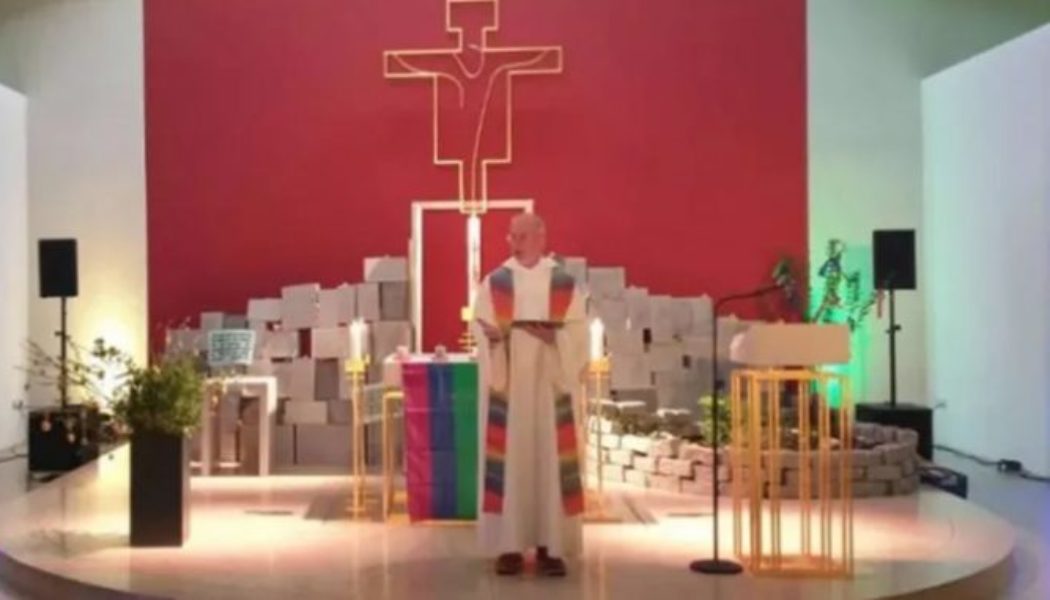
The consequences of the Synodal Way cannot be gauged yet. Much was decided: The dioceses in Germany are to enable the blessing of homosexual couples. They are to allow lay people to preach at Mass. They are to propagate an image of man that complies with gender ideology and ask the Pope to lift the obligation to celibacy and to examine whether women can be admitted into the ministry after all.
The discussion of all these topics was justified with the prevention of abuse. Officially, the Synodal Way had been established for this purpose. Since then, however, that purpose has merely served as an all-too transparent fig leaf. Whoever expressed doubts regarding the legitimacy of the process was reminded that the goal was, after all, the prevention of abuse.
But just how the discussion of lay preaching, for instance, would serve that goal, why the celibacy of priests should be lifted, even though the MHG-study*, to which the Synodal Way refers, explicitly sees no connection between abuse and celibacy (which is in line with other studies on the subject): none of these things were taken into consideration.
Instead, the abuse scandal serves as a vehicle for interested parties to enforce what some church officials, a part of the Federal Association Catholics and of Academic Theology, have demanded for decades: a comprehensive self-secularization, the abandonment of central beliefs and traditional faith practices. Here we also find the reason why it is so hard to explain what the Synodal Way actually consists of: anyone with a minimal understanding of religion must find this process absurd. For religions revolve around truth. But how is one supposed to vote on truth?
Walking together is only possible on the foundation of the Church of Christ
Ten texts on three (of a total of four) topics were “passed” at the fifth Synodal assembly: priesthood, women in the Church, and Catholic sexual ethics. Are the decisions being implemented in the dioceses?
In some dioceses, such as Aachen or Berlin, for instance, homosexual unions are, in fact, already being blessed, despite explicit interdiction by Rome. Initiatives are being organized where men and women preach at Holy Mass on their own authority. All these things are already happening and are widely tolerated, regardless of the fact that a rather substantial number of the faithful suffer and do not agree with them.
And here lies a fundamental problem with the Synodal Way: it claims to be “synodal,” which means being on a “common path.” Walking together, as has been asserted consistently in recent years, was the way forward for the Catholic Church. A Catholic, who is faithful to the Magisterium, would counter that this “walking together” is only possible on the foundation of Christ’s Church and her teachings.
In the Bätzing-Stetter-Karp Church there is no place for Catholics who are faithful to the Magisterium
But even without this appeal to divine authority, based solely on how the Synodal Way sees itself, this process is implausible: repeatedly, Irme Stetter-Karp, for instance, president of the Central Committee of German Catholics (ZdK) and thus part of the presidium of the Synodal Way, and Bishop Georg Bätzing, president of the German Bishops’ Conference (DBK) and likewise head of the presidium, have made it clear that in the church they envision there will be no room for dissenters.
Those who disagreed were laughed at, put under pressure, labeled as psychopaths, placed in the vicinity of right-wing extremists, accused of promoting acts of violence against minorities, and indirectly even of being responsible for suicides. None of this happened behind closed doors: anyone can watch the live streams of the meetings and verify all of these statements.
The “walking together” thus consisted mainly in the silencing of those who did not follow the majority opinion. This extended even into the voting results: the Synodal Way can boast that papers were adopted with nearly 100 percent approval rate. Proof of overwhelming unanimity? Actually, there were abstentions, but these were simply not counted.
In concrete terms, for example, the paper calling for the diaconate of women, i.e. making ordained ministry available to women, was adopted with 93.65 percent approval. However, this figure only comes about because 13 abstentions are not included in the overall calculation. During the deliberations, Bishop Bätzing even used his authority as president of the bishops’ conference to emphatically urge his dithering confreres to abstain if they could not accept the text.
Under canon law the Synodal Way does not exist
The Synodal Way is therefore in no way democratic. This also manifests itself in the blatant breach of law that briefly made the headlines before the last Synodal assembly: in the fourth plenary assembly the minority had been deprived of the right to a secret ballot. Even though this was contrary to the statutes, as several canon law experts have since determined, the Synodal Way has adhered to this false interpretation of the statutes even now. Those concerned, however, have no recourse, because under canon law the Synodal Way does not exist!
This form had been decided upon, because establishing a synod was in no one’s interest. A synod would have been defined by canon law and could not have been used to push through the secular agenda of the ZdK and several bishops. The resolutions in their entirety are therefore non-binding—theoretically. The respective delegates, however, are completely indifferent to this. They have agreed to a kind of church role-playing game: they have created a parallel universe, in where agreements apply that are dictated by the game masters.
In that universe, it is a sign of tolerance to ridicule the bishop who asks for a secret ballot, a sign of rationality to burst into tears when a factual argument is presented, and a sign of democratic consciousness to erase abstentions from the overall result and to manipulate voting patterns.
The Sovietization of dioceses was postponed—for now
In the world of the Synodal Way, a non-body under canon law is entitled to make non-decisions with non-legitimation. Whoever points out that “the emperor is naked” can expect to be hounded by the secular as well as the ecclesiastical press, and to be pressured by church officials. In this manner the Synodal Way is attempting to force decisions from the parallel world into the reality of the Church.
That this procedure has limits became manifest through the fate of the core piece of the agenda texts, of all things: a paper was supposed to be adopted, according to which councils for “joint consultation and decision-making” should be established in all parishes and dioceses, or developed from existing consultative bodies. Even Cardinal Walter Kasper, not exactly a conservative hardliner, commented in strong words on the proposal to restructure the church into a council system: a “Supreme Soviet in the Church” was “obviously not a good idea.” An assessment apparently shared by Pope Francis, who has explicitly forbidden the project on several occasions.
At this point, even disenfranchised bishops regained their voices: faced with the choice of entering into open disobedience against Rome, a remnant of ecclesiastical sensibility became apparent and the Synodal proponents had to fear that the text would be rejected. So it was postponed and thus failed—for now—because of the factual authority of the Pope.
The Rhine still does not flow into the Tiber
One can only fervently hope that this authority will be able to keep further aberrations at bay. For the resourceful church officials wisely ensured that the end of the Synodal Way would not be the end of their project of remodeling doctrine and Church: at the Synodal assembly, they elected a Synodal Committee. This committee is to discuss the postponed texts and prepare a Synodal Council for the whole of Germany by 2026. This council is then supposed to steer the fate of the Church in Germany for an indefinite period of time.
The fact that the Pope has vetoed this project, too, is being deliberately ignored; after all, there is still a lot of water going to flow down the Rhine until 2026. But German Catholics must beware: The Rhine does not flow into the Tiber. At the Synodal assembly, it was made clear with great matter-of-factness that the doctrine and the faith of the Church are considered negotiable. If this conviction is shattered by Roman realities, one can only hope that it will not tear the Church apart.
Related at CWR:
• “The Catholic Church in Germany after the Synodal Way: Three Scenarios” (February 23, 2023)
• “The Church in Germany is on the path into total insignificance” (February 6, 2023) by Birgit Kelle
*Translator’s note: MHG refers to a consortium of various German scientific institutions: the Central Institute of Mental Health in Mannheim, the Institute of Criminology at the University of Heidelberg, the Institute of Gerontology at the University of Heidelberg, and the Chair of Criminology, Juvenile Law and Corrections at the University of Gießen. This consortium published a report, entitled “Sexual abuse of minors by catholic priests, deacons and male members of orders in the domain of the German Bishops’ Conference”, and the acronym MHG refers to the locations of the consortium: M(annheim)-H(eidelberg)-G(ießen).
Editor’s note: This essay was first published in German on the corrigenda* website and is posted here with kind permission of the author. The essay was translated by Frank Nitsche-Robinson.
If you value the news and views Catholic World Report provides, please consider donating to support our efforts. Your contribution will help us continue to make CWR available to all readers worldwide for free, without a subscription. Thank you for your generosity!
Click here for more information on donating to CWR. Click here to sign up for our newsletter.








